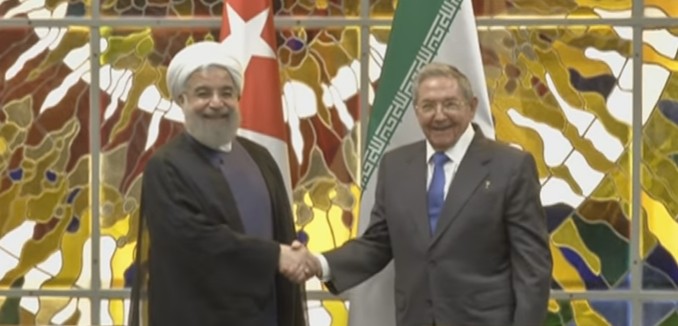Members of Congress are warning that a recent White House directive to share more sensitive intelligence with Cuba will in turn benefit Iran, which is developing a larger footprint in Latin America, the Washington Free Beacon reported Monday.
The policy directive, issued on October 14, instructed the U.S. director of national intelligence “to find opportunities for engagement on areas of common interest” with Cuba’s intelligence agencies, which lawmakers fear will pass along information to Iran.
“The director of national intelligence, General James R. Clapper, testified in February 2016 that the Castro dictatorship remained an espionage threat at the level of Iran, behind only China and Russia,” Rep. Mario Diaz-Balart (R. – Fla.) told the Free Beacon. “Under these circumstances, President Obama’s directive to encourage intelligence sharing with the Castro regime is reckless, dangerous, and contrary to U.S. national security interests.”
“The Castro regime in August and September 2016 deepened ties with Iran through high level visits, and there are reports that Iran-backed terrorist group Hezbollah has established a base in Cuba,” the congressman added.
Iranian Foreign Minister Mohammad Javad Zarif’s trip to Cuba, Venezuela, and other Latin American countries in August was meant to bolster Tehran’s “growing terrorist network in the region and ensure the Islamic Republic maintains its presence along America’s doorstep,” sources told the Free Beacon.
While Iran and its proxy Hezbollah have maintained a presence in Latin America for some time, the country now has the means “to pursue a footprint in the region as a result of the cash windfall provided by last summer’s comprehensive nuclear agreement,” the Free Beacon added.
In one such example, the opening of Iran’s new embassy in Chile has coincided with an increase in Hezbollah activity, congressional sources told the Free Beacon. This development reflects a common Iranian strategy previously outlined by Ileana Ros-Lehtinen (R. – Fla.), chair of the House Subcommittee on the Middle East and North Africa. “Tehran’s classic playbook is to use cultural centers, new embassies or consulates, or cooperative agreements on various areas to act as façades aimed at expanding Iran’s radical extremist network,” she told the Free Beacon in August.
Victoria Coates, national security adviser for Sen. Ted Cruz (R. – Texas), shared similar concerns regarding the intelligence sharing directive. “[T]he Castros are aggressively pursuing a closer relationship with Iran, the mullahs just refinanced Cuba’s debt with the assets they got from the president’s nuclear deal, and Cuba’s close ally, Venezuelan strongman Nicolas Maduro, visited Iran this week,” Coates told the Free Beacon. “Meanwhile, Vladimir Putin is re-establishing Russian intelligence assets in Cuba 90 miles from the United States.”
“What possible confidence can we have that anything we share with the Castros won’t immediately be telegraphed to Tehran and Moscow? This simply makes no sense,” Coates added.
Iran’s presence south of America’s border also poses other threats. Following Zarif’s regional trip in August, Emanuele Ottolenghi, a senior fellow at the Foundation for Defense of Democracies, observed that Zarif was looking to revive aspects of his country’s ballistic missile program in Latin America as a way of evading U.S. sanctions.
Ottolenghi similarly warned in a policy brief last week that Iran is building up its influence in Central and South America. Cuba, he wrote, “is the most recent and unlikely addition to Iran’s growing network of missionary centers.” The converts Iran is attracting in Cuba are “as radical in their version of Islam and their hatred for the West as those radicalized by Sunni extremists. … Tehran sees them as the vanguard of its Islamic revolution in America’s own backyard.”
[Photo: AFP news agency / YouTube ]




